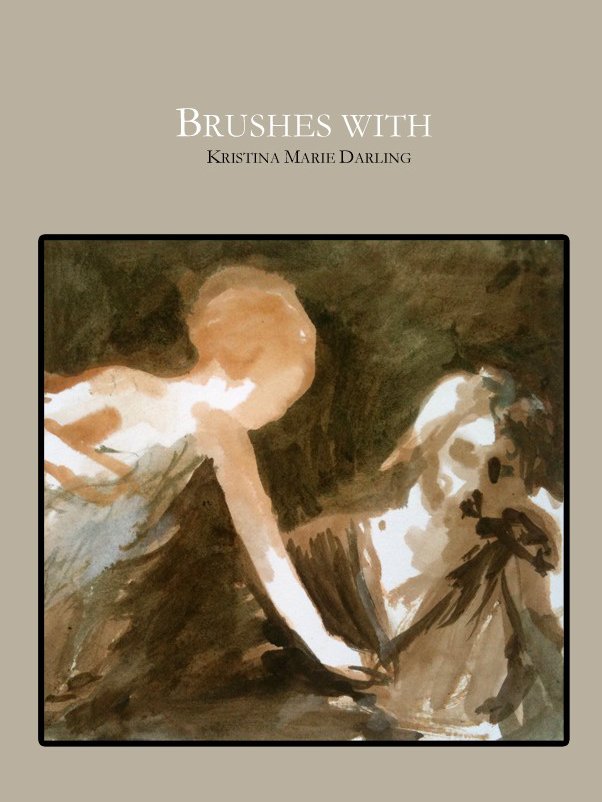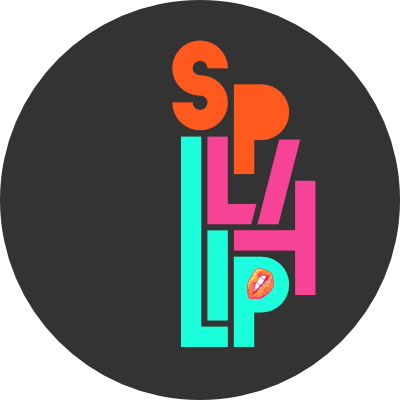J. Scott Bugher
 It was a joy reading Kristina Marie Darling’s new book Brushes with and it is a privilege to have the chance to discuss the book with this brilliant avant-garde writer. She is a master of innovative form. There is a famous quote from poet Robert Creeley: “Form is an extension of content,” and Kristina Marie Darling indeed a master of using such things as footnotes, terms found in dictionaries, glossaries, erasure, etc blended with prose poetry. In sum, fragmentation. Through the course of reading Brushes with—which you should because it’s available HERE—you’ll find all sorts of unique gems that masterfully tell this story.
It was a joy reading Kristina Marie Darling’s new book Brushes with and it is a privilege to have the chance to discuss the book with this brilliant avant-garde writer. She is a master of innovative form. There is a famous quote from poet Robert Creeley: “Form is an extension of content,” and Kristina Marie Darling indeed a master of using such things as footnotes, terms found in dictionaries, glossaries, erasure, etc blended with prose poetry. In sum, fragmentation. Through the course of reading Brushes with—which you should because it’s available HERE—you’ll find all sorts of unique gems that masterfully tell this story.
I would first like to thank you for dehydrating my highlighting marker in its entirety. There is much to take in when reading your new book Brushes with. I want to dive into the book here soon, but could you tell me if this has this always been your gig: experimental writing? Was there ever a time you wrote more conventional prose or poetry? Where did it all start and what brought you to the writer you are now?
When I first started writing, I was very traditional. Much of what I wrote was autobiographical. Failed relationships, Missouri, and the suburbs were almost always my chosen subjects. Reading other poets was what helped me incorporate more variety in my writing. I read everything I could get my hands on, which ranged from Gary Snyder to Joshua Clover and even The Maximus Poems. I started to understand that the poet isn’t always the speaker of the poem, but rather, poets can experiment with the techniques of fiction writing. I’d have to say that reading, and being exposed to many ideas outside of my own comfort zone, taught me the importance of innovation, experimentation, and risk-taking in poetry. It’s fine to write from one’s lived experience, but one shouldn’t be afraid to take liberties with both form and content when writing from autobiography.
Now for Brushes with. Would you say the book is a recollection, or as you mention in footnote #33, a souvenir?
I’m very interested in the poetic text as a memento, a seemingly small object charged with emotion and mystery. That’s why I choose to publish some of my books as pocket-sized editions. With that in mind, I like to think of my poetry books as being much the same as the tokens, trinkets, and other miniature objects that appear throughout my writing. I imagine the reader inscribing the poetic text with their own memories, dreams, and wishes, in much the same way one would a souvenir. I try to incorporate this idea in the presentation of the work itself.
You must be a fan of patterns, connections and motifs. Footnote #30 mentions recurring motifs, and I see several: visual aids, damage, machinery, weapons, dresses, fire—all of them in one form or another. No pun intended, but how did you map out this book?
That’s a great question. I never really map out my books or make outlines. I’m much more of an intuitive writer. When working on a book, I like to return to images, themes, and motifs that appear earlier in the text, inscribing them with new possibilities for interpretation. But these are often spontaneous judgments, which I make when the book is already in process. I’m a strong believer in trusting the unconscious, since I believe that many of the most exciting possibilities for literary texts reside there.
Let’s talk about themes. The first I noticed was feminism and elements that conflict with it. Heavy doses of this theme are found especially in “Cartography,” “Antarctica,” and “Utopia,” which I’d love to discuss more but do not want to spoil anything. Anyway, footnote #10 talks about an interest in role reversals. Is this simply the interest of a French film director, or is it your interest?
I’m very interested in role reversals in literary texts. Most of my books appropriate what might be considered male literary forms—particularly the forms of academic discourse—and fill them with subversive content. Brushes with in particular allows female characters and their experiences to inhabit footnotes, glossaries, and other traditionally male forms of writing. I have an enduring interest in critiquing the power structures associated with these modes of communication, but also expanding what’s possible within them.
The next theme that strikes me is a blend of damage and violence. We’ve got shattered glass, blades, broken dishes and fire. This book is by no means a book of gore, but it is rather vicious, more than we’d like to think. How do you express such destruction subtly through poetic language?
That’s something that I often struggle with in my writing practice. I use footnotes a great deal because of what they allow me to leave unsaid. Fragmented forms—like footnotes, endnotes, glossaries, and erasures—allow the writer to suggest, rather than explicate, narratives of violence. I think that suggesting violence can be more powerful than describing it in great detail. I say this because fragmentation, and incompleteness, leave space for the reader’s imagination. The reader can shape the narrative into what’s most significant for them, given their lived experience.
You are a fan of unique juxtaposition, no? For example, you write on page 23: “I imagined frost accumulating on the furniture. Your face darkening like a house buried in winter.” This is juxtaposed with a pretty important part of the book. What triggers such ideas when you write?
I love using provocative juxtapositions in my writing because I believe that it fosters a more active role for the reader. He or she is invited to forge connections between different elements of the text, and participate in the process of creating meaning from the book. In many ways, it is the reader who actualizes the book through his or her imaginative work.
I was curious about the time period this is all taking place. Footnote #18 states that a statue would later be found headless in a tiny museum. With all of the connections shared with statues and figurines, does that footnote establish how far in the past or future we are?
I like to think of the book as a challenge to our preconceived ideas about temporality. While most of us think of time as linear, I’m very interested in creating narratives that occur across temporal boundaries, ultimately bisecting past, present, and future. When writing Brushes with, I tried to present time as circular and elliptical, rather than creating a clear progression from one event to the next. I’m very interested in alternative definitions of temporality, as these new models of how time works offer exciting possibilities for how we think about history. For example: most of us think of history as fixed, permanent, and static, whereas it could be conceived of as changeable, and subject to constant revision.
Through the course of your footnotes we get a bit of a glossary of terms. The ones that stuck out to me were Direction, Violence, Delicious, Melancholia, Empire and Arsenal. How or why do you use this device to direct the plot? I think it’s fantastic, but wanted to hear what you had to say about it.
I love dictionary definitions, because they show us how equivocal language can be. Many of the dictionary definitions I chose to include in Brushes with give conflicting, unusual, or seemingly unrelated meanings for the same word. By including this found text, I hoped to explain what came before in the text, but also complicate it, opening up new possibilities for interpretation. When writing Brushes with, the dictionary definitions often served as writing prompts, as these conflicting definitions would open up new directions for the plot I had started to imagine.
Lastly, allow me to say that this has been the best book I’ve read in a long time despite the fact that I pretty much read only mainstream fiction and simple narrative poetry. It’s nice every now and again to read a book while using a highlighter, pencil and a pad of paper to really experience the text in a complete manner. I got so much out of reading Brushes with and I’m thankful for you giving me such a wonderful episode of reading.
Thank you for the great questions! I’m very glad to hear that you enjoyed the book. And I appreciate your careful reading of the text.
